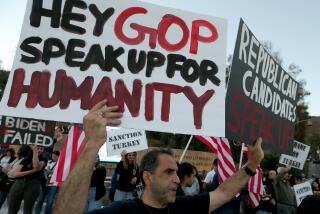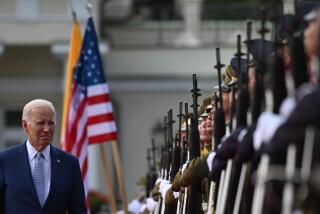THE WASHINGTON SUMMIT : Baltic Freedom Rally Puts Pressure on Bush : Protest: Thousands gather on Capitol steps as 2 U.S. lawmakers demand a tougher stance from the President.
- Share via
WASHINGTON — Chanting “Freedom now!” and waving yellow, green and red Lithuanian flags, thousands of ethnic Americans rallied Friday on the front steps of the Capitol against Mikhail S. Gorbachev’s crackdown on the secessionist Baltic states.
Bused in from as far away as California, protesters roared with approval as Sen. Alfonse M. D’Amato (R-N.Y.) and Rep. Robert K. Dornan (R-Garden Grove) called on President Bush to put pressure on the Soviet president to recognize Lithuanian independence and let democracy prevail in neighboring Estonia and Latvia.
“I have a message for you,” said D’Amato, surrounded at the podium by cheering protesters, the Capitol dome behind him. “ Lyetuva bus laisva --Lithuania will be free!”
“Mr. Gorbachev, we are upset,” D’Amato said. “Although you may have been schooled in the art of Western politics and public relations, you must understand that freedom is something that can never be compromised.”
Both Dornan and D’Amato were interrupted repeatedly by the crowd’s synchronous shouts of “Freedom now!” and “ Aciu !”--the Lithuanian word for “thank you.”
The rally, the first major public outburst against Administration policy during the summit, was called by Lithuanian-American groups to protest Bush’s gingerly response to Lithuania’s declaration of independence. AFL-CIO President Lane Kirkland and former U.S. Ambassador to Poland Richard Davies also blasted Bush’s Baltic policy.
Bush and Gorbachev, occupied with a range of highly sensitive issues from German reunification to arms reduction, so far have put the political future of the three Baltic republics on the summit back burner.
Hundreds of protesters hefted signs that bore impatient, angry slogans, such as “Less Dialogue--More Action” and “We Want ‘Someday’ to Come Today.” Some took aim at Bush, such as “Bush Makes No Deals With Terrorists . . . Unless They’re Russian.”
Many signs were directed at the perceived cozy relationship between the conferring presidents: “Gorby and Bush: Tiny Lithuania Is Bigger Than Both of You,” “Gorby Runs the White House.” In one titled “Wake Up, George,” a pajama-clad Bush was depicted lying beside the Soviet president in a yellow, green and red bed.
Dornan, who emphasized that he is “a Bush man,” nonetheless offered the President a suggestion:
“All he (Bush) has got to do is tell Mr. Gorbachev, ‘I must stand with the Baltic nations, because their embassies have been recognized in our country since the early 1920s. We will not turn our back on our friends.’ ”
The Orange County Republican’s message fired up the crowd. Many present were first-generation immigrants or descendants of Lithuanians who fled their homeland, either during World War II or after the Soviets annexed the Baltics in 1940.
“We don’t want this summit to be a one-sided public relations maneuver by Gorbachev, that everything’s rosy, peachy keen,” said Marijus Gudinskas, 36, who had driven more than 10 hours from his hometown of Hamilton, Canada, with his Lithuanian wife and two sons.
Like many present, Gudinskas was not sure whether Bush or Gorbachev would be swayed by the protest, but emphasized his determination.
“We can’t let the world forget. That’s our job,” he said, holding his 2-year-old son, Vincas, in his arms. “I still have hot water. I still have food on my table. I still have medical supplies and oil. They (in Lithuania) don’t. It’s my responsibility as a Lithuanian, the least that I can do, to protest the Soviets’ oppression.”
Said Mary Vizgirda, secretary of the Lithuanian-American chapter in Aurora, Ill., who at age 7 fled Lithuania with her family: “I must protest the Lithuanian occupation. Otherwise, I could never look in the eyes of Lithuanians in Lithuania again.”
More to Read
Sign up for Essential California
The most important California stories and recommendations in your inbox every morning.
You may occasionally receive promotional content from the Los Angeles Times.













